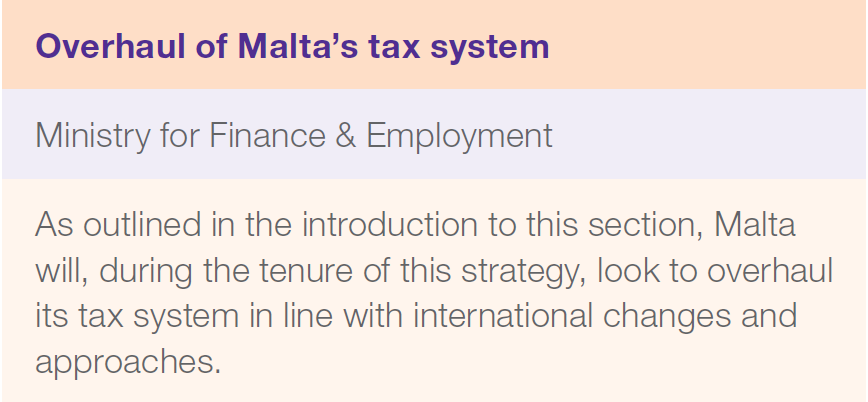The PN MEP candidate stressed that Malta’s right to veto tax changes at EU level remains unchanged.
On Wednesday (yesterday), the National Strategy for Financial Services prepared by the Malta Financial Services Advisory Council (MFAC), was launched. It included a wide range of proposals, such as an overhaul of the tax system.

Changes to Malta’s corporate tax regime, away from the current imputation system, was first announced by the Minister in April 2022.
One of the reasons cited for the overhaul in the national strategy is the impending introduction of a proposed global corporate tax rate of 15 per cent on multinational corporations earning over €750 million in revenues. The proposal was introduced by the Organisation for Economic Co-operation and Development (OECD) in collaboration with the G20, in a bid to combat a race to the bottom on tax rates used to attract foreign investment.
While Malta has been one of the voices against a common minimum corporate tax rate at the EU level, it has reluctantly agreed to the global corporate tax rate proposed by the OECD/G20.
Speaking during the launch of the strategy document, Minister Clyde Caruana told attendants, “I prefer swallowing the bitter pill now and introducing changes to the corporate tax regime gradually than having the EU chasing us or even imposing changes on us.”
On the same day, when speaking at The Malta Chamber’s 2023 AGM, Minister Caruana said that the EU is pushing for major reform in tax harmonisation in 2025.
Dr Agius took great issue with Clyde Caruana blaming the EU for the decision to increase the corporate tax rate.
The MEP candidate took to Facebook and referred the Finance Minister to article 115 of the EU Treaty, which indicate that changes to taxes at the EU level require unanimity in the Council of Ministers, meaning Malta had the right to a veto in this regard.
In a statement, Dr Agius said, “the Minister of Finance is misleading the public when he cites Europe as the reason for his Government’s decision to change the current set of incentives to FDI in Malta. Article 115 of the EU Treaty did not change and is not set to change – that article foresees that all member states retain the right to veto on decisions on tax matters. Clyde Caruana should come clean and explain to the Maltese people that his Government’s real motive to increase tax in Malta is the €9 billion deficit accumulated after years of squandering the public purse including the Vitals €400 million fraud.”
Nevertheless, Malta did not exercise its veto and an EU Directive on the introduction of a minimum 15 per cent tax rate for the largest corporations in line with the proposal of the OECD/G20 received unanimous support from EU member states.
Malta has until the end of 2023 to tranpose the Directive into law.
Speaking to BusinessNow.mt, Dr Agius explained that the introduction of the international minimum tax rate is not in Malta’s interest, and that, “we should defend our interests tooth and nail.”
He also took issue with the fact that the Government wants to change the tax rules for all companies, not just those earning over €750 million.
He also explained that, while for the OECD proposal is just for companies earning over €750 million, the EU will continue pushing for a common minimum tax rate for SMEs as well.
“We should not be making any concessions at all,” said Dr Agius.
The Labour Party’s electoral manifesto had included a pledge to reduce the national corporate tax rate from 35 to 25 per cent, on profits remaining within the companies. At the time the Minister had explained that under their proposal, the reduced tax rate would only apply for the €250,000 of profits generated by the company, and dividends paid out to shareholders will continue to be taxed.
However, in April last year, Minister Caruana had also revealed that Malta will be moving away from the imputation system which allows foreign companies based in the country to benefit from an effective five per cent corporate tax through refunds and rebates.
So with the introduction of a global tax rate on multinational big earning firms, a decrease in national corporate tax and removing the tax imputation system, Malta could see an overall decrease in tax revenues.
However Minister Caruana insisted that the reform will be revenue-neutral and that the country will retain its competitive advantage. Therefore, an emphasis on tax compliance is necessary.
And, while the Labour Party has pledged that while in Government it will lower the local corporate tax rate, Dr Agius believes that acquiescing to an EU push for a harmonised corporate tax rate for foreign companies will harm Foreign Direct Investment (FDI).
He said that Malta has maybe one or two companies which surpass the €750 million in revenues, but if Malta reduces the threshold he said, “this would affect FDI, and you have various industries in Malta that are tax sensitive.”
“You will have many types of businesses that would not move to Malta,” added Dr Agius. He went on to say that, “this is the price to pay for corruption.”
“The construction industry slowing down, they’ll have to stop selling passports, this is a natural consequence.”
“We should never put it on the table that the veto is up for discussion, we should never give it up, as it’s the only guarantee we have as a country that doesn’t have natural resources or connectivity,” concluded Dr Agius.
Featured Image : Peter Agius Facebook Page
Self-employed, employees and companies contribute €2.1 billion in 2023
Parliamentary data reveals five-year growth trends in fiscal contributions
MFSA concludes review of Crypto-Asset Service Providers following MiCA implementation
The Authority provided clear expectations and guidance to address certain concerns.
Malta Development Bank to launch schemes supporting sustainable development and creative sector
In 2024, the MDB launched the SME Guarantee Scheme and the Guaranteed Co-Lending Scheme






